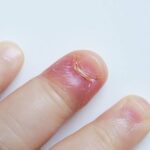While it might not be the first thing on your to-do list, prioritizing regular skin checks could save your life.
Though a trip to the gym wasn’t uncommon for John Ahern, the bruising he noticed after a particularly strenuous workout was unusual. Ahern’s board-certified dermatologist, Lindsay S. Ackerman, MD, FAAD, made a life-saving observation: the bruises indicated a severe blood issue. After testing, Ahern was diagnosed with a rare form of leukemia.
Ahern’s story offers an important reminder to pay attention to the body’s largest organ and is one of many examples that show how the skin is a window to overall health.
“While bruising can be common, when it appears in unusual areas or in the absence of trauma, it can represent problems with other organ systems,” Ackerman said.
Performing regular self-exams can familiarize people with their skin and help identify areas of concern. For example, Yvonne Basil noticed changes to a mole on her toe and quickly scheduled an appointment with her board-certified dermatologist. After a same-day surgical biopsy, Basil’s dermatologist, Dr. Seemal R. Desai, MD, FAAD, confirmed it was melanoma, the deadliest form of skin cancer. Because of the early diagnosis and treatment, doctors stopped the spread and Basil is now cancer-free.
“While Yvonne’s melanoma was very serious, it could have been much worse had she not found the mole and quickly made an appointment with a board-certified dermatologist,” Desai said.
Regularly checking your skin from head to toe can help catch skin cancer and other conditions early when they are most treatable. These simple steps recommended by the experts at the American Academy of Dermatology to perform a skin exam could help you detect a condition early:
- Examine your body in a full-length mirror
- Look at your underarms, forearms and palms
- Look at your legs and soles of your feet and between your toes
- Use a hand mirror to examine your neck and scalp
- Use a hand mirror to check your back and buttocks
- Take note of all the spots on your body, including moles, freckles and age spots
People of all skin tones should perform skin self-checks. When skin cancer develops in people of color, it is often diagnosed in its later stages, making it more difficult to treat. If you notice any new or suspicious spots on your skin, or any spots that are changing, itching or bleeding, make an appointment with a board-certified dermatologist.
To learn more, visit SpotSkinCancer.org.
ABCDEs of Melanoma
Melanoma is the deadliest form of skin cancer. However, when detected early, it is highly treatable. These warning signs can help you identify melanoma:
- Asymmetry: One half of the spot is unlike the other half.
- Border: The spot has an irregular, scalloped or poorly defined border.
- Color: The spot has varying colors from one area to the next.
- Diameter: While melanomas are usually greater than 6 millimeters, or about the size of a pencil eraser, when diagnosed, they can be smaller.
- Evolving: The spot looks different from the rest or changes in size, shape or color.
Did You Know?
Dermatologists are trained to diagnose, treat and manage more than 3,000 conditions of the skin, hair and nails.
Photos courtesy of Getty Images
SOURCE:
American Academy of Dermatology
Pennsylvania Parenting Magzine is the ultimate resource for parenting news, opinions, articles, and events across the commonwealth of Pennsylvania.
We offer moms and dads stories that are timely, informative and reader-friendly on important issues such as childcare, family life, education, adolescence, motherhood, and teens. You’ll also find fun, easy and inexpensive family activities and events.
Pennsylvania Parenting Magzine reaches about 5,000 visitors per month. Our email database is comprised of 10,000+ moms and dads, while our social media reach is over 8,000 connections across the country.
For more information, please contact our managing editor, Daniel Casciato, at writer@danielcasciato.com.






